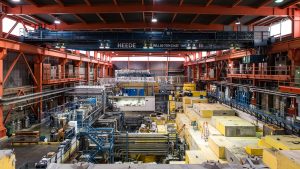TRIUMF leads and contributes to answering some of the world’s most challenging questions in the field of particle physics, including how antimatter works, what happens when neutron stars collide, and what holds together the nuclei of atoms.
It is Canada’s particle physics accelerator centre, home to over 600 researchers, engineers, technical experts, and students.
Partnerships to advance innovation in Canada
TRIUMF is home to Canada’s largest scientific and research infrastructure, including recent substantial investments in two new world-leading research platforms.
As Canada’s particle accelerator centre, we enable the country to collaborate and compete with other major international facilities in the delivery of world-class science and innovation and attract top global talent to Canada.

As a globally sought-after collaborator, we project Canadian leadership and innovation onto the international arena, connecting to national and international laboratories around the world and translating our research into socioeconomic benefits for Canada.
How does particle physics contribute to other industries?
TRIUMF has a strong track record of taking the technologies developed for these experiments and deploying them to solve real-world problems.
For example, the facility is developing new medical isotopes that image and treat advanced cancers and use energy from supernova explosions in space. These provide X-ray-like visibility down to 1km beneath the Earth’s surface, enabling greener mining.
From supporting Nobel-prize-winning research that elucidates unknown facets of the Universe to creating new life-saving drugs and devices, we use our particle accelerator complex and highly skilled community for the betterment of society.
Areas of expertise
- Nuclear physics
- Particle physics
- Accelerator science
- Materials sciences
- Life sciences
- Isotope beam production
- Tech transfer and commercialisation
Research interests
- Nuclear physics and nuclear astrophysics
- Cosmology, the early universe, and dark matter
- Radiopharmacy and medical isotopes
- The development of next-generation particle accelerators and associated technologies
- The production of high-intensity isotope beams for physics
- Green technologies
- Quantum technologies


